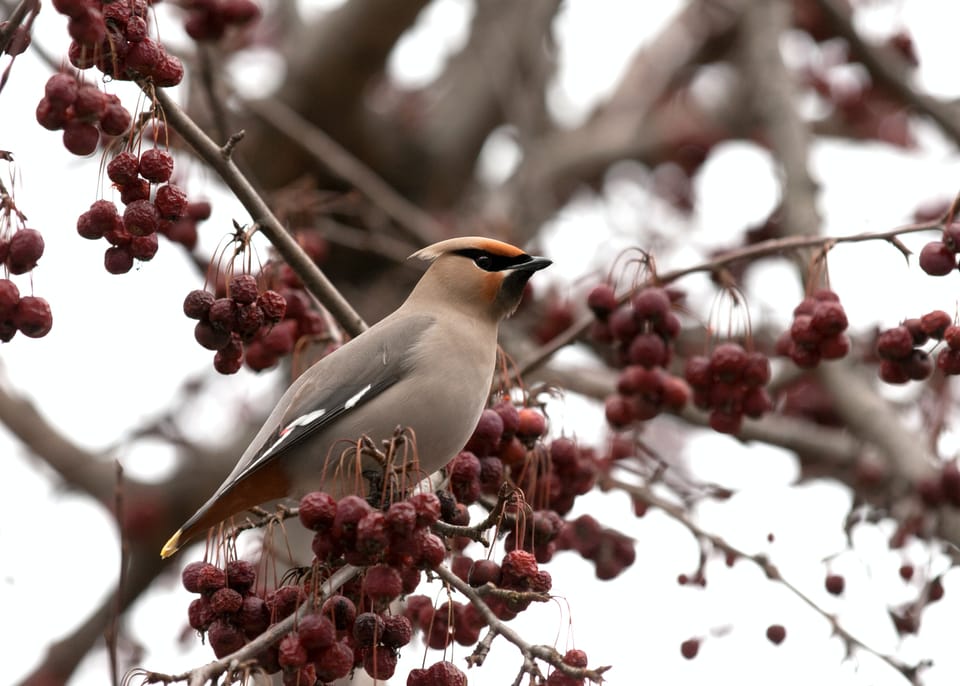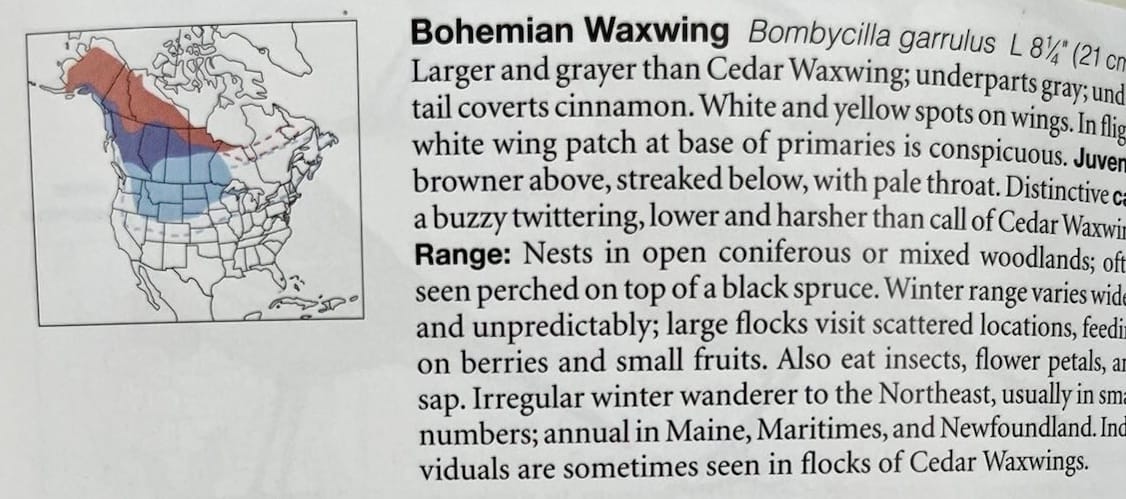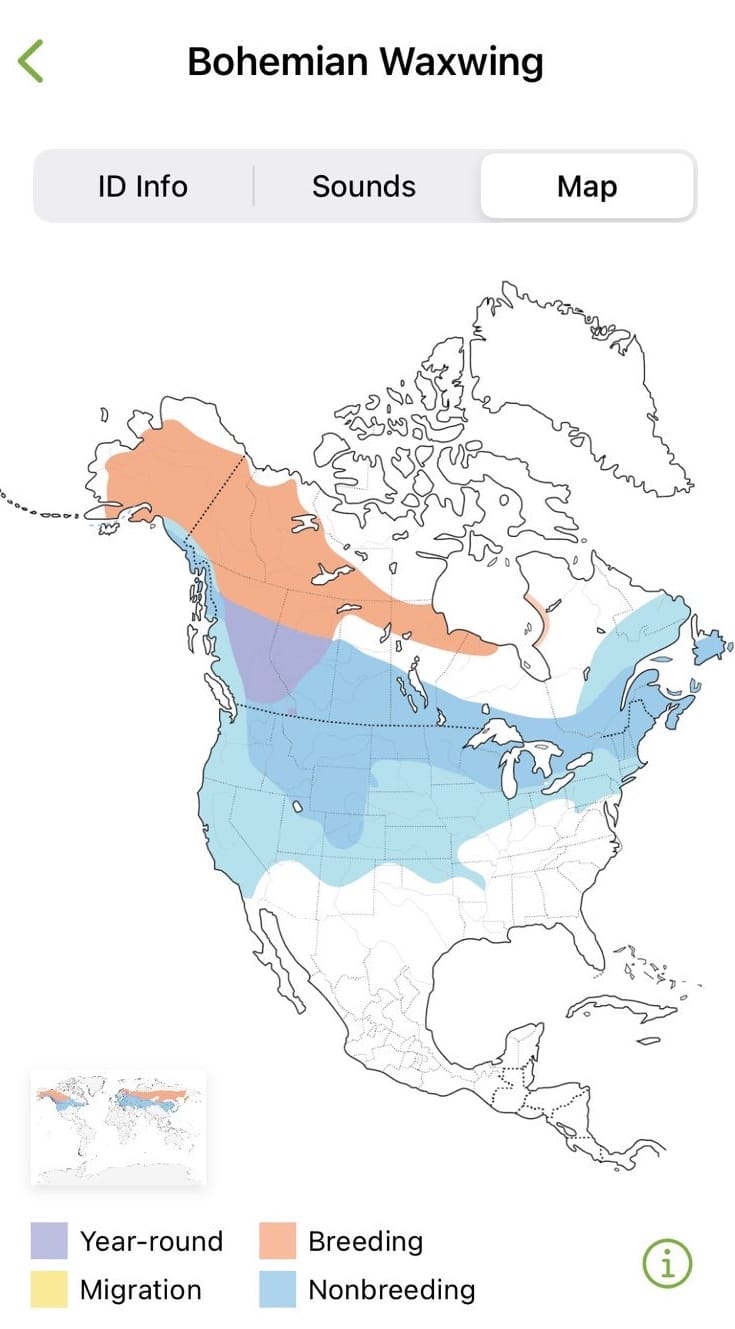2024 New Year's Bird

If you're in Canada, this informational google doc is updated almost daily with information, scripts, and direct actions you can take to pressure our government into withdrawing its support for Palestinian genocide. If you're in the US, Jewish Voice for Peace has many tools for coordinating action. I hope that wherever you are in the world you're finding ways to work for the liberation of all people.
Dear Friends,
On the first morning in January I dressed in the dark, then moved through the house avoiding windows. There's one in particular, in our living room, that looks out on to a big beautiful pine, where at most times of day I can reliably spot cardinals and chickadees. I shunned it. January first is a questing day, a day to wander outside no matter the weather and meet the New Year's Bird, a tradition I've engaged in since 2020: an exhortation to greet the first bird of the year with attention. Over time I've interpreted "first" in various ways—first I hear? See? First to hear and see? First to be different from last year's?—but integral to my process is the sense of seeking, of quest.
This year began with a different first: I carried binoculars, having treated myself to a good pair before attending Wayward last year. Bedecked with them I wandered towards a park I've enjoyed spending time in, taking stock of weather and surroundings, trying to be alert to encounters.
Almost immediately I began hearing crows behind me. I love crows, and have a history of draping them in augury, but was determined not to look behind me; I wanted to keep walking forward, make it to the park, and find what I would find there. Still, I thought, a Year of the Crow sounds potent, moving.
When I arrived at the park, I stood in quiet for a while, and contemplated the weather: mild, no snow on the ground, the day a little overcast. I watched a tree line, heard crows again, and then, there, far over the trees, glimpsed a silhouette of Most Probably Crow flying away from me, and I felt disappointed. I found myself thinking, well, but it could have been a raven at that distance, so since I can't know for sure I should keep looking and see if a crow presents itself to me more significantly.
A flock of dark shapes appeared above me, flashing and flexible, and I thought, starlings? And instantly (and slightly guiltily) felt that I'd rather have the crows, but lifted the binoculars to follow them until they settled on a tree. I was surprised to find that they weren't starlings, but robins—a childhood bird I'm used to seeing in lone, repeated instances, a harbinger of spring. In our family we'd make a wish on the first robin we saw in spring; I was deeply surprised to see it in a large winter group, but it turns out that American Robins don't so much migrate as change their behaviour in winter.
Closer, then, this feeling of something stirring in my chest, but still not quite right. I pondered robin versus crow, didn't like feeling that I was choosing on a technicality, or making a choice at all. I didn't want it to feel like a choice, but like the receipt of a letter—something I could feel was addressed to me wherever I happened to be standing. In my first year out I wanted to be surprised and affirmed; in subsequent years I'd felt the rightness instantly. This dithering wasn't what I wanted.
I turned towards home, and as the sun started coming out, I saw hairy woodpeckers climbing a nearby tree, and marvelled at them, but felt them out of bounds; on what basis could the third bird I see speak the year? I loved seeing them all the same. Soon after that I saw a white-breasted nuthatch, one of my deep favourites to find by ear. But no, I maintained in vague confusion, crow or robin, probably, I'd have to figure it out when I got home.
I got home. I shucked off binoculars, boots, and winter coat. I found Stu in the living room next to the big beautiful window, hot coffee at the ready, and sat down to sip it with him and tell him my birding dilemma from start to finish.
When I was done, he looked out the window—the same window I'd so deliberately avoided. "What's that bird?" he asked.
I turned around. I do not exaggerate when I say I fully screamed, leapt from the couch, grabbed the binoculars and ran to the door.
There was a flock of Bohemian Waxwings across the street.
Chris Rimmer calls waxwings "Itinerant, Unpredictable Winter Jewels," giving some eloquent articulation to my feelings on the subject. I saw a Cedar Waxwing for the first time last summer, but not this, this sheer wild bounty of birds unmistakably descending on the neighbourhood's wealth of wrinkled crab apples and rowan berries raisined by the cold. Only once before have I seen what was (probably) Bohemian Waxwings, one winter day sometime between 2016 and 2019, before Merlin and life lists and more confident IDs, certainly before any deliberate seeking out of birds on my part, but it had seemed like an accident or a miracle then too. Bohemian Waxwings seem to have been steadily spreading eastward over the last seventeen years; comparing their current spread in Merlin to the maps in my 2006 National Geographic's Field Guide to the Birds of North America is astonishing.


I watched them, utterly exhilarated, thrumming with joy.* A friend I burbled to observed "it feels very special to have a bird that visits for winter, when you're so far north," and I agree. I keep thinking about this in relation to portents and augury: I'm expecting winter visitors, looking forward to their arrival, preparing space and fruit bowls for the jewel of their itinerant company. But I'm also waiting, this month, to learn whether or not we get to stay in this house past August; whether Stu and I will have to turn bohemian ourselves and take to our wings in search of a place to sustain us.
Inventing a guy in my head to get mad at me, I could say the Bohemian waxwing isn't my New Year's Bird, but Stu's; I should go back to teasing apart my feelings about crows and robins and what they mean within my personal mythography. I might quip to the guy in my head: well, we're married! We can share our birds!
But I like, instead, to reflect on the experience, the circle of it: I went in search of something, hoping to earn it, but ultimately found it at home after someone I love pointed it out. I might try to read in it an encouragement to look at what I have and see the wonder in it, winter jewels already in my hands. I might try to make a tarot spread of them, see in crows and robins and waxwings the importance of flocks and families, of lineage and solidarity, of recognizing fruit in all seasons.
Mostly, though, as is becoming usual: none of that matters as much as the pleasure of getting to see some cool birds. To begin as I mean to go on: seeking, looking, noticing, sharing stories of what I find.
Wishing you all the best with the coming year,
Amal
*While I dithered over titling this Stu had the temerity to muse "would you say you've been... Rhapsodizing about it," and I will not speak further of my actions in response.
Postscripts
- On Saturday, January 6 at 12PM EST, this incredible reading event will be streamed in support of the Edward Said Libraries. An event featuring Mosab Abu Toha, Kaveh Akbar, Rabih Alameddine, Ammiel Alcalay, Hala Alyan, Peter Balakian, Fatima Bhutto, Leila Farsakh, Nick Flynn, Ru Freeman, Carolyn Forché, Damian Gorman, Jorie Graham, Fanny Howe, Ha Jin, Ilya Kaminsky, Canisia Lubrin, Askold Melnyczuk, Eileen Myles, Viet Thanh Nguyen, Shuchi Saraswat, and Lloyd Schwartz, it is not to be missed. Here's the description:
Gaza’s libraries have been destroyed over the course of the last several months of bombing. The Edward Said Public Libraries, the first English-language libraries in the region, have been at risk for months and require support for their continued existence.
Libraries, as Mosab indicates, are critical places of learning, solace, and cultural preservation.
During this virtual event, free to attend and streaming on YouTube, preeminent writers will offer short readings in a show of solidarity with the literary and reading communities of Palestine, and a confirmation of the vital nature of literature and access to written culture.
You can register for free at the link or tune into Brookline Booksmith's YouTube channel, and you can donate in support of the libraries here.
- The creators of Israelism have decided to make the documentary available to stream indefinitely while Israel continues its US-supported genocide against Palestinians. Having now watched the film, I truly recommend it, and if any friends want to discuss it with me I'll make myself available. I want it to be widely watched and digested, and I think I'll need to write something more comprehensive about it as time and tide allow. There's also this Q&A with the film's directors, and you can organize screenings of the film in your city.
- If you're Canadian, I urge you from the bottom of my heart to read and send this letter to your MPs, demanding that Minister of Immigration Mark Miller remove the outrageous, arbitrary and racist cap on emergency family reunifications for Palestinian-Canadians.
The racist nature of the cap is exemplified in the immigration measure’s asymmetry with Canada’s emergency travel measures for Ukrainians following Russia’s invasion in 2022. That program, which similarly provided 3-year temporary status, imposed no cap on applications, and at least 616,000 individuals were approved. (Proportionately, based on relative population sizes, this would work out to about 30,000 from Gaza.) The government also provided financial support and up to two weeks of temporary accommodations to Ukrainian applicants – something not accorded to applicants from Gaza. Further, the program was not restricted to the family members of Canadians – as per the program for Gaza – but any Ukrainian national and their family members could apply.
Standing in sharp contrast are the measures implemented for only 1,000 family members of Canadian citizens and permanent residents in Gaza.
This effectively forces Palestinian-Canadians to compete with each other for the prize of extracting their family members from a war zone, and it's absolutely unconscionable. Please write, call, do whatever is available to you to lend your voice in support of Palestinians at this truly horrifying time.
Member discussion